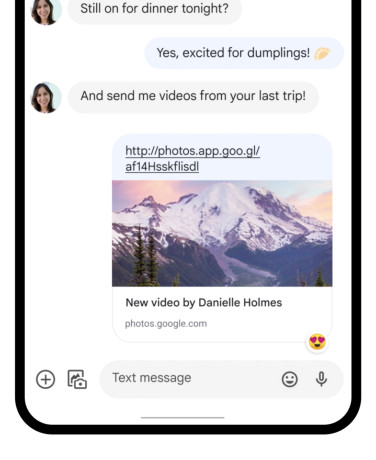Major Update to Google Messages Brings iPhone-Compatible Emoji Reactions
Mar 10, 2022, 11:25 AM by Rich Brome @rbrome.bsky.social

Google today started rolling out a major update to its Messages app, the default SMS and RCS messaging app on most new Android phones. It includes several major new features, but the biggest for most people may be automatic conversion and tidier display of emoji reactions from iPhone users. When an iPhone user "likes" or "loves" (etc.) a message in a conversation, it will now be displayed as a simple emoji attached to the original message, instead of a whole separate message with the original text repeated. Emoji reactions work between iPhones using Apple's protocol originally known as iMessage. They also work between Android phones using the open, industry-standard RCS protocol. But because iPhones do not support RCS and iMessage is a closed and proprietary, communication between iPhone and Android devices defaults to the outdated SMS/MMS protocols, which do not support newer features like reactions. So reactions are sent in plain text. This is still the case, but Messages will now intercept and "translate" these messages to present them properly. Another new feature is Organized inbox, which automatically sorts your messages into Personal and Business tabs. Messages can now also automatically delete one-time password messages after 24 hours, reducing inbox clutter. It can also help remind you to reply with "gentle nudges" when it detects that you may have stopped in the middle of a conversation for a period of time. Finally, when sharing a video, there will now be an option to share a link to that video on Google Photos instead of sending the video itself. That will enable users to share high-quality videos with iPhone users, instead of sending a very low-quality video via the outdated MMS protocol as before. (RCS allows sharing high-quality videos directly with other Android users.) Google says it will bring the link-sharing feature to photos as well in the future. Most of these features are available first for the English language only, with other languages to follow. The new version of Messages will "roll out over the coming weeks".
Comments
No messages


 iPhone 15 Series Goes All-In on USB-C and Dynamic Island
iPhone 15 Series Goes All-In on USB-C and Dynamic Island
 Google Adds Satellite SOS to its Affordable Pixel Phone
Google Adds Satellite SOS to its Affordable Pixel Phone
 Google Adding AirDrop to Android
Google Adding AirDrop to Android
 Google Bringing Generative AI to Android Messages, Wallpaper
Google Bringing Generative AI to Android Messages, Wallpaper
 Google Adds Profiles, Animations, and Color Choices to Messages
Google Adds Profiles, Animations, and Color Choices to Messages





